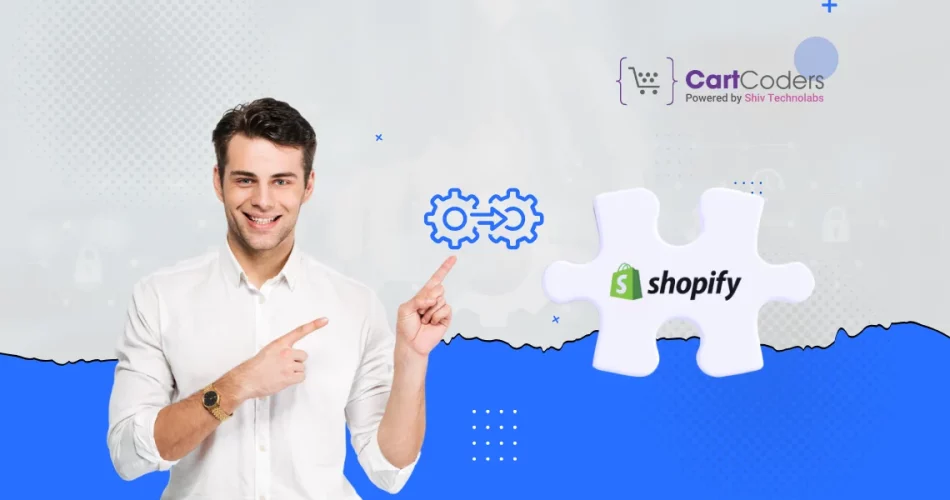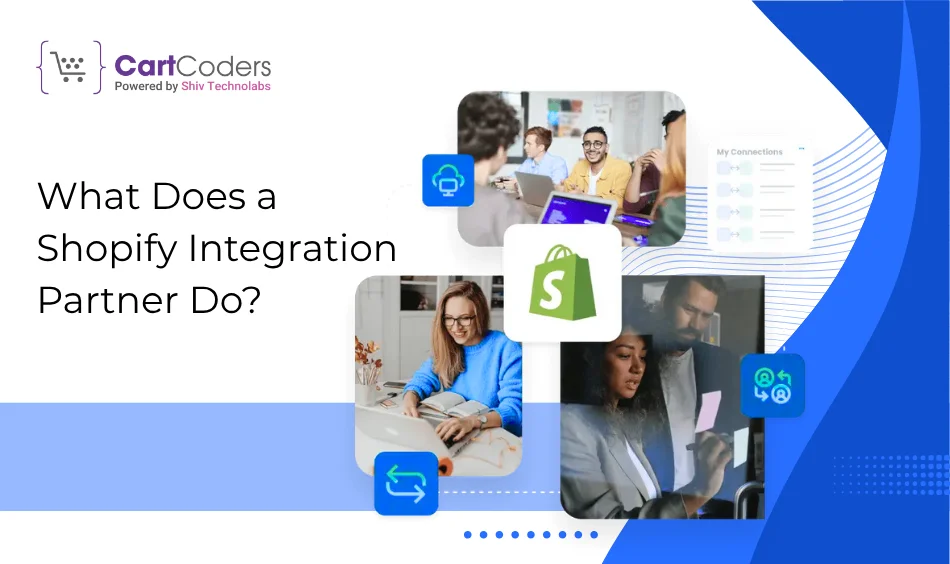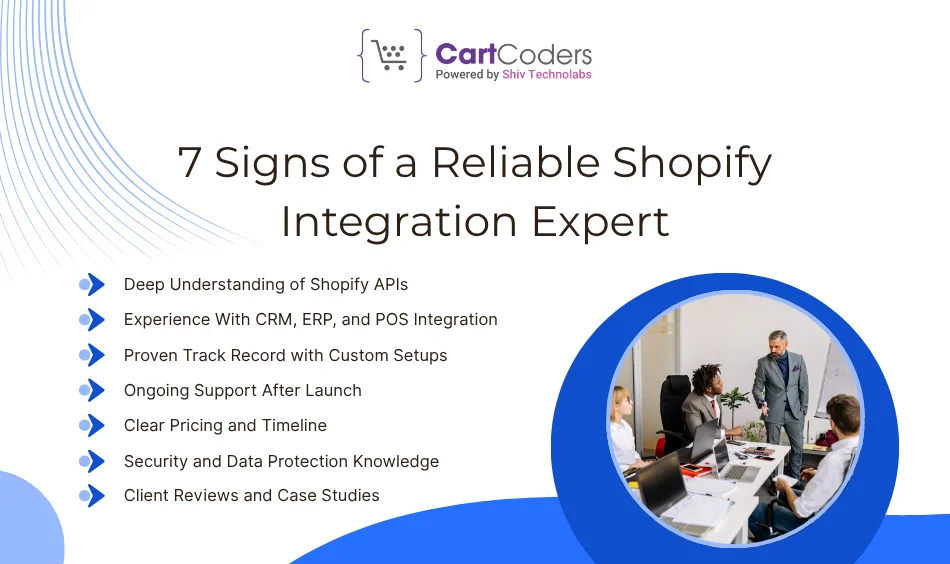Custom Engagement Solutions
Unlock tailored solutions with a free, no-obligation strategy session.
Expert Developers & Engineers on Demand
Scale Your Team with Skilled IT Professionals
Expert Guidance for Digital Transformation

Nowadays, operating a Shopify store is more than listing products. Today, Shopify ranks 10th among the top global services. The majority of store owners incorporate three to five distinct third-party Shopify integration services to support the crucial aspects of their business, such as marketing, CRM, shipping, payments, and inventory management. However, when these systems fail to integrate, problems arise. Orders go missing. Inventory becomes incorrect. Customers leave.
That is why selecting an excellent Shopify integration partner is more significant than people think. Trustworthy integration unites all systems, makes data synchronized in real-time, and contributes to your shop functioning properly, not only under normal conditions but also when traffic surges or when apps are updated.
Be it a CRM, an ERP, or a combination of multiple tools, having a professional Shopify integration specialist is a real game-changer. Don’t just build a simple store. Here is how to choose a third-party Shopify partner that would do it all.

Some may think a Shopify integration expert only links apps or sets up APIs. But that’s just the start.
A proper Shopify integration partner acts like a system builder behind the scenes. They help all your tools share information, prevent breakdowns during heavy usage, and make sure your setup can grow over time. They don’t only connect services—they make the entire system more stable and efficient.
Here’s what they usually help with:
They connect your customer database, such as HubSpot, Salesforce or Zoho to Shopify. When set up properly, your contact details, sales history and subscriber groups completely synchronize on the fly. This enables marketing and sales teams to respond quickly and make informed decisions.
They integrate your store and tools such as SAP, NetSuite, or Odoo. This makes it very easy to manage orders, inventory, accounting and supply chain. It is beneficial to businesses that involve bulk purchases or bulk selling.
The partner bridges the gap between payment tools and shipping services, loyalty programs, and customer support software. Whether you are using ShipStation to handle logistics or Klaviyo to send emails, they ensure everything gets integrated to make your customer experience seamless.

Not all Shopify experts are the same. Some can hook up your APIs but might disappear when problems pop up. A strong integration partner understands both the technical aspects and how to create long-term value.
Here’s what to check before hiring anyone:
The partner should fully understand how Shopify’s APIs work. This means they know how to manage tasks such as checkout changes, product syncing, stock updates, and order tracking using both the Admin and Storefront APIs.
They must have real-world experience working with major tools such as HubSpot, Salesforce, Zoho, Microsoft Dynamics, or NetSuite. They should also know how your business logic works, not just how to link apps.
No two businesses are the same. Some use subscriptions; others sell through Instagram or other platforms. Your integration partner should have experience with working on unusual workflows and building custom solutions to manage them.
APIs don’t stay the same forever. Apps get updated. New services are added. A good partner won’t disappear once your integration is done. They’ll offer help for future issues, upgrades, and fixes as needed.
Avoid teams that give vague answers about cost and time. A trustworthy integration expert will provide accurate pricing, a set timeline, and a clear plan. This helps avoid delays and going over budget.
Your customer data must be safe. Best security practices should be observed by the integration team. This covers such measures as data encryption, GDPR or CCPA compliance and taking care of API keys, particularly when it comes to personal or payment related information.
Request to show previous work. Check out case studies or reviews, particularly of other companies, which are similar to yours. They will be able to do your setup much quicker and effectively in case they have done a similar setup to yours in the past.
Your budget is not the only factor that would determine the type of Shopify integration partner you choose. This is a simplified look at what your key choices are, and how different options will play out.
| Option | Pros | Cons |
| In-house Dev | Full control, can iterate daily | Expensive, slower to onboard, limited skills |
| Freelancer | Affordable, fast for small projects | Risky, often lacks depth & long-term support |
| Agency | Skilled team, end-to-end capabilities | Higher cost upfront, but better ROI long run |
Whichever you decide, do not partner with a person who can only handle code well. Make sure they understand how Shopify works and how your business runs.
Before signing a contract, ask these five questions to make sure you’re working with the right team:
1. What platforms have you integrated with Shopify before?
Find out if they’ve worked with the tools you use. If your store relies on NetSuite or Klaviyo, avoid companies that have only worked with tools like Mailchimp or Google Sheets.
2. Do you support ERP/CRM tools directly or via middleware?
Some teams write custom code for direct connections, while others use tools such as Zapier or Make. Ask them which method they prefer and why. The decision has an impact on both cost and reliability.
3. What happens if an integration breaks after go-live?
You don’t want to be on your own after launch. Enquire about the time they offer support, how quickly they can be contacted in case of a bug and whether they use service level agreements (SLAs).
4. How do you handle version changes or API updates?
Shopify updates regularly. So do third-party tools. Your partner should be prepared to monitor for changes and address any issues that arise from outdated code or new API versions.
5. Will I get post-launch support or just handover?
Some companies deliver the code and walk away. Others offer ongoing help, monthly maintenance, or regular monitoring. Select a group that remains engaged even when the job is over.
Choosing the proper Shopify integration partner is not only a technical choice. It’s a smart business move. A good partner will:
Don’t hire someone who just links tools. Hire someone who builds an integration system that grows with your store.
If you’re searching for a team that meets all these points, read on.
CartCoders is a top Shopify Integration Company having handled hundreds of Shopify integrations, from simple links to complex multi-tool setups. We don’t just make services work together; we help them run better together. Whether it’s a CRM, ERP, or full tech stack connection, we make the job simple.
Here’s what CartCoders offers:
Explore our Shopify Integration Services. Let’s help you build a backend that supports everything your front-end needs.
Projects delivered in 15+ industries.
95% retention rate, building lasting partnerships.
Serving clients across 25+ countries.
60+ pros | 10+ years of experience.